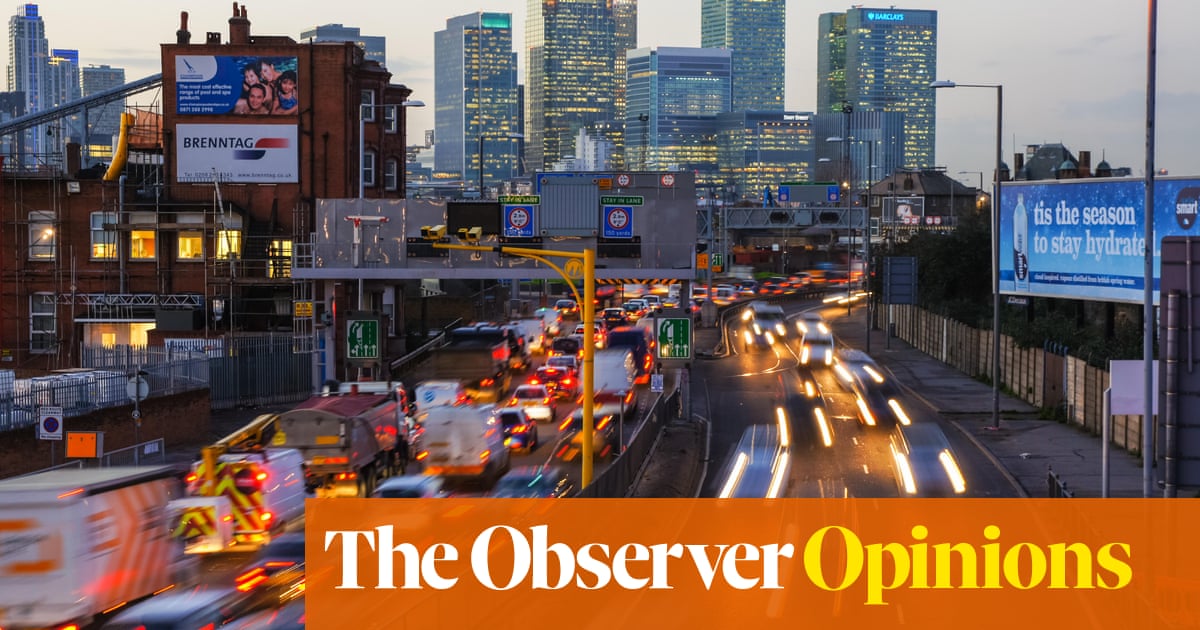For a decade, green activists in Britain have been congratulating themselves on their luck. Unlike in many countries in Europe, where motorists, farmers and rightwing groups have been driving anti-climate action, the UK has long enjoyed a comfortable political consensus on the subject. But conditions for a greenlash are assembling.
Most Britons still say theysupport climate efforts, but the price of decarbonising may at last be about tohit our wallets. Meanwhile, the Conservative party has come a long way since it sported a little green oak tree as its logo. Last month, Kemi Badenoch declared a full culture war against net zero, which she said couldn’t be achieved “without a serious drop in our living standards or by bankrupting us”.
The UK is joining a global trend. Populist parties in Europe scored big victories last year, politicians opposed to climate action are gaining ground in Canada and Australia, and, most importantly, America has withdrawn from the Paris agreement. As international agreements break down, reasons to be selfish multiply. Why should other countries strain to preserve the planet as America steams ahead?
Climate change has of course always been a collective action problem. This applies even to those at the sharp end. Australian bush fires linger in recent memory, yet there is a strong groundswellagainst climate actionin the country. That is not illogical: the fires were a consequence of global, not local, emissions – Australia could shave its carbon footprint to nothing and still be the victim of other countries’ carelessness. But it is an early warning. As the worst effects of climate change show up on our doorsteps, we may still find plenty of reasons not to act.
As countries retrench, then, it might be time for activists to take another approach. Rightwing populists tend to be good at communicating the costs of climate policies; their opposition, by contrast, is not good at advertising the benefits. As altruistic arguments go out of fashion, we may need to make a self-interested case for going green.
We could start with air pollution, correlated with carbon emissions. In the UK, bad air is estimated to cause up to43,000 deathsa year. City dwellers are accustomed to inhaling foul-smelling smog as they jog and open their front windows, but they are breathing in particles that wreak havoc on their bodies. Every few weeks, scientists find a new way in which it is messing with our health. Pollution is known to hurt the heart and lungs, butmore recent findingsinclude dementia, bladder cancer, childhood leukaemia, diabetes, cognitive delay, autoimmune diseases, osteoporosis, skin ageing, cataracts – these are the trade-offs for driving our belching vehicles.
Meanwhile, fossil fuels are filling our homes with noxious gases. Domestic boilers seep nitrogen oxides, which inflame airways and trigger respiratory disease. Gas cookers are thought to contribute to3,928 early deathsa year in Britain, by triggering heart and lung conditions. Children in homes with gas stoves are 42% more likelyto have asthma.
Traffic has more insidious effects, too. A surprising recent finding is the effectcontinuous noise has on health; living by a busy road causeslow-level stress, and, in the long term, that increases the risk of stroke, diabetes and blood clots. Too much exposure to traffic noise hurts children’s brain development. Cutting down traffic in cities will also make them better in other ways. Wherever city centres are pedestrianised, they flourish, with economic and social benefits. Walking and cycling is better for us.
Sign up toObserved
Analysis and opinion on the week's news and culture brought to you by the best Observer writers
after newsletter promotion
And swapping to cleaner energy supplies will eventually reduce financial costs, too: in the long term, countries reliant on fossil fuels will be left behind. Solar panels are becoming ever cheaper.Electric carswill soon be less dear than petrol and diesel ones, as battery prices continue to fall across the world and producers start to focus on the mass market. They are already cheaper to run. Better insulated homes and more heat pumps will lead to lower energy use. Energy security is another reason to switch to renewables: relying on imported fossil fuels makes countries vulnerable to geopolitical events beyond their control.
A general rule: proponents of “good causes” tend to emphasise their moral case, but stone cold pragmatism can work better. Those advocating on behalf of prisoners, homeless people and drug addicts often try to appeal to public empathy, but this runs short, especially when times are hard. Better to appeal to self-interest. Treating prisoners badly makes the public less safe when they are released; fail to deal with homelessness and this will cost us when people must be kept in emergency housing. Stinginess with addiction treatment entrenches the problem, making addicts dependent on state provision. So too with climate change.
And if the self-interest of individual countries does not yet perfectly align with preserving the planet, it will someday. The consequences are likely to be so catastrophic that any action to mitigate it will eventually be worthwhile. In the meantime, activists should apply pressure at the points where altruism and selfishness most overlap: a switch to electric vehicles, electric stoves and heat pumps will make us happier and healthier.
Martha Gill is an Observer columnist
Do you have an opinion on the issues raised in this article? If you would like to submit a letter of up to 250 words to be considered for publication, email it to us atobserver.letters@observer.co.uk
